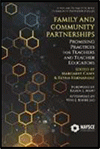
Family and Community Partnerships
Promising Practices for Teachers and Teacher Educators
Edited by:
Margaret Caspe, National Association for Family, School, and Community Engagement
Reyna Hernandez, National Association for Family, School, and Community Engagement
A volume in the series: Family School Community Partnership Issues. Editor(s): Diana Hiatt-Michael, Pepperdine University.
Published 2023
Family and Community Partnerships: Promising Practices for Teachers and Teacher Educators, offers a fresh new look at the competencies, strategies, and practices that effective educators develop to build strong partnerships with families and communities. Written by leaders in the field, the book is an outgrowth of a cutting-edge initiative led by the National Association for Family, School, and Community Engagement to reimagine how educators are prepared for family and community engagement. Based on four guiding practices - reflect, connect, collaborate, and lead alongside families – each section of the book highlights theory, real-world strategies, discussion questions, and activities that can be used by teachers, teacher educators, and professional learning specialists to inspire new ideas for courses, workshops, and for self-reflection.
CONTENTS
Foreword, Karen L. Mapp. Editor’s Note, Reyna Hernandez and Margaret Caspe. INTRODUCTION: Reflect, Connect, Collaborate, Lead: Family Engagement Core Competencies, Margaret Caspe and Reyna Hernandez. SECTION I: REFLECT. It’s Not Another Thing To Do, It’s Another Way To Be, Anne T. Henderson. Preparing Novice Teachers through Cultural Educators and Real-Life Teacher Experiences, Patricia J. Norman and Beth R. Giles. Growing in Critical Cultural Awareness: Understanding Ourselves to Strengthen Our Work With Children, Families and Communities, Yasmin Morales-Alexander. Opening Minds to the Power of Partnerships With Families Through Online Learning Modules, Katherine T. Ratliffe, Caryl H. Hitchcock, and Polly J. Quigley. SECTION II: CONNECT. Culturally Responsive and Sustaining Relationships With Families, Joanna D. Geller and Danielle M. Perry. Creating Connections With Families of Young Children Using Trauma-Informed Approaches, Shulamit Natan Ritblatt, Audrey Hokoda, and Felicia V. Black. Building Relationships With Families Through the Tribal Home Visiting Program, Deborah Roderick Stark. Family Engagement in the Digital Age: Relationships First, Susan K. Walker, Malina Her, Tatiana Jara Pacheco, and Lila Khan. Afterschool and Summer Partnerships, Jillian Luchner. Preparing Educators to Build Interprofessional Relationships Through Case Stories, Gloria Miller and Darcy Hutchins. SECTION III: COLLABORATE. Family Stories: Collaborating to Promote Family Literacy, Patricia A. Edwards, Marliese R. Peltier, and Leah Porter. Mothers as Co-facilitators of Mathematics Learning Experiences, Marta Civil, Fany Salazar, Maria Hernandez, Silvia Mata, and Lorena Murdock. A Multi-Generational Approach to First Generation College Success, Betsy Nikolchev, Carmen Meza-Ponce, and M. Elena Lopez. Transforming Learning and Student Outcomes Requires Co-Construction With Families, Araceli Simeón, Teneh Weller, Yolande Beckles, and Rosa RiVera Furumoto. Family as Faculty in a Special Education Teacher Preparation Course, Cristina Santamaría Graff. SECTION IV: LEAD ALONGSIDE FAMILIES. Building a Better Table: Families and Communities as Architects of Imagination in Teacher Education Reform, Wilisha Scaife, Eva Zygmunt, and Kristin Cipollone. Focus on Families: Strategies for Developing Preservice Teachers’ Capacity for Effective Family Engagement, Michele Myers and Anthony Pittman. Parent Perspectives on Leadership, Bianca Scott, Lora Evans, Rosazlia Grillier, Hayward Mclain, Lisa Mosko Barros, Matthew John Rodriguez, Zully Rodriguez, Julia Sosa, Alice Clark, Caroline Rose, and Cecilia Liang. Teacher Leadership: Improving Family Engagement Practices and Policies, Weadé James. Promoting Family Engagement Through CAEP Standards, Banhi Bhattacharya and Malina Monaco. Leading for More Inclusive Communication, Rebecca Bauer and Helen Westmoreland. Afterword, Vito J. Borrello. About the Authors.
-
Paperback979-8-88730-300-0
Web price: $45.04 (Reg. 52.99)
-
Hardcover979-8-88730-301-7
Web price: $80.74 (Reg. 94.99)
- eBook979-8-88730-302-4

- EDU038000 - EDUCATION: Student Life & Student Affairs
- EDU034000 - EDUCATION: EDUCATIONAL POLICY & REFORM: General
- EDU029000 - EDUCATION: TEACHING METHODS & MATERIALS: General
-
 Composing Storylines of Possibilities
Immigrant and Refugee Families Navigating School
Composing Storylines of Possibilities
Immigrant and Refugee Families Navigating School
-
 Critical Perspectives on Education Policy and Schools, Families, and Communities
Critical Perspectives on Education Policy and Schools, Families, and Communities
-
 Family Involvement in Faith-Based Schools
Family Involvement in Faith-Based Schools
-
 Promising Practices for Engaging Families in Literacy
Promising Practices for Engaging Families in Literacy
-
 Promising Practices for Engaging Families in STEM Learning
Promising Practices for Engaging Families in STEM Learning
-
 Promising Practices To Empower Culturally And Linguistically Diverse Families Of Children With Disabilities
Promising Practices To Empower Culturally And Linguistically Diverse Families Of Children With Disabilities
-
 The Power of Community Engagement for Educational Change
The Power of Community Engagement for Educational Change

